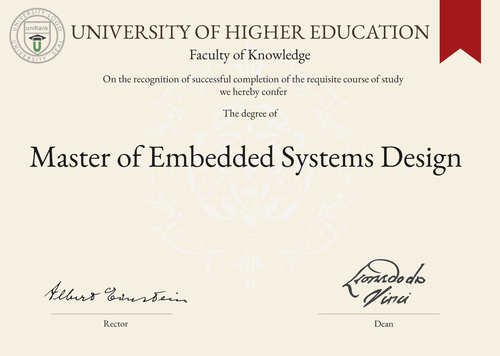
Master of Embedded Systems Design (M.E.S.D.)
Guide to Master of Embedded Systems Design Program/Course/Degree
Master of Embedded Systems Design (M.E.S.D.)

Program Name:
Master of Embedded Systems DesignProgram or Degree abbreviation:
M.E.S.D.Duration range:
Varies by country and university (typically 1-2 years)Tuition range:
Varies by country and university (typically $10,000-$30,000 per year)Overview:
The Master of Embedded Systems Design program is designed to provide students with advanced knowledge and skills in the field of embedded systems. This program focuses on the design, development and implementation of embedded systems, which are computer systems integrated into various devices and products. Students will gain expertise in areas such as hardware design, software development, real-time systems and system integration.Curriculum Overview by year:
The curriculum of the Master of Embedded Systems Design program is typically divided into multiple semesters or years. The specific courses and their order may vary by university, but generally, students can expect to study topics such as: - Year 1: Introduction to Embedded Systems, Embedded Hardware Design, Real-Time Systems, Embedded Software Development - Year 2: Advanced Embedded Systems, System Integration, Embedded Systems Security, Elective CoursesKey Components:
The key components of the Master of Embedded Systems Design program include a strong focus on both hardware and software aspects of embedded systems. Students will learn to design and develop embedded systems, work with real-time operating systems, integrate various components and ensure system security. The program also emphasizes practical hands-on experience through projects and internships.Career Prospects:
Graduates of the Master of Embedded Systems Design program can pursue various career opportunities in industries such as automotive, aerospace, consumer electronics, telecommunications and medical devices. They can work as embedded systems engineers, firmware developers, system architects, or embedded software engineers. The demand for professionals with expertise in embedded systems design is high and job prospects are promising.Salary Expectations:
The salary expectations for graduates of the Master of Embedded Systems Design program can vary depending on factors such as the country, industry and level of experience. On average, professionals in this field can earn a salary ranging from $70,000 to $120,000 per year.Conclusions:
It is important to note that the duration, tuition fees, curriculum, key components, career prospects and salary expectations of the Master of Embedded Systems Design program can vary based on the chosen country or location of study, as well as the chosen university. Prospective students are encouraged to research and compare different programs to find the best fit for their goals and preferences. Visitors can search for where this specific degree (Master of Embedded Systems Design) is offered anywhere in the world through the uniRank World Universities Search Engine, which provides comprehensive information on universities and their programs worldwide.World Universities Search Engine
search for Master of Embedded Systems Design (M.E.S.D.) and add the Location (country, state etc.) or specific University you are interested in studying at.
Query examples:
- Master of Embedded Systems Design (M.E.S.D.) United States
- Master of Embedded Systems Design (M.E.S.D.) United Kingdom online
- Master of Embedded Systems Design (M.E.S.D.) Australia international students
- Master of Embedded Systems Design (M.E.S.D.) University of California
- Master of Embedded Systems Design (M.E.S.D.) University of London tuition fees
- Master of Embedded Systems Design (M.E.S.D.) University of Sydney scholarships
Share Program/Course
Interesting? Share this program/course/degree info with your friends now.